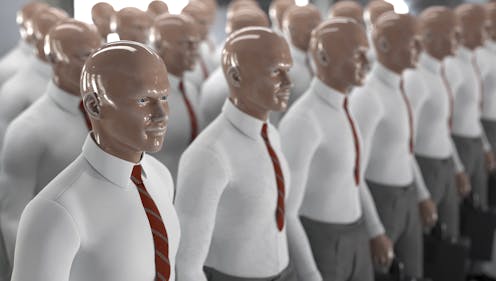Can we ever fully separate our work and home lives? Philosophy suggests we should stop trying
- Written by Peter West, Teaching Fellow in Early Modern Philosophy, Durham University

If you could take work-life balance to its most literal extreme, what would it look like? That’s the central theme of Severance, the sci-fi series that has just finished airing on Apple TV.
Employees working for the fictional corporation Lumon are able to undergo a procedure where their consciousness and memories are divided between work and home. Employees who have been “severed” do not remember anything about their life at work when they clock out, or anything about their home life during working hours.
Severance quickly becomes unsettling when it is implied that in isolating the memories of someone’s work life, a new person is created – a slave who lives only to work. These “new” employees (people’s work-selves) are told they can leave the office whenever they like, but inevitably find themselves sent back to work by their home life counterparts who don’t want to lose their jobs and do not have to endure the horror of living only in the office.
It’s safe to say most of us wouldn’t undergo such a procedure – after all, work is also a place where we make friends who can even help us[1] in our home lives. But the concept presented in Severance raises deep philosophical questions about the relationship between our memories and ourselves.
There are signs that within the world of Severance, there is more to a person than what they can remember. In the opening episode, the main character goes home to find that he has a cut on his forehead from an accident at work that of course, he cannot remember. This is an ominous sign that the scars that your work-self accrues are scars on you, and not some other person. More worryingly, perhaps this means that severed employees are subjecting themselves to a tortuous existence – one made worse by the fact that they cannot remember it.
There are good reasons[10] to believe that who “I” am is more than just what I remember – after all, many things have happened to me that I cannot easily recall. How many of us struggle to remember big moments in life, like job interviews?
The timing of Severance’s release is interesting because, after two years of working from home, genuine work-life separation seems less realistic than ever. For many, “work” is not some place we leave home for every morning, but perhaps a spare room or a kitchen table. Consequently, many of us are looking for ways to establish a clean divide between work and our personal lives. But – in line with the message at the heart of Severance – perhaps instead, we should be trying to make peace between the different parts of our lives and thereby understand our full selves better.
References
- ^ help us (theconversation.com)
- ^ This article is part of Quarter Life (theconversation.com)
- ^ News of war can impact your mental health – here’s how to cope (theconversation.com)
- ^ Would you bring your dog to a shop? Why retailers should be more pet-friendly (theconversation.com)
- ^ Why it makes good business sense for your employer to look after your mental health (theconversation.com)
- ^ Locke’s answer (plato.stanford.edu)
- ^ George Berkeley (plato.stanford.edu)
- ^ Thomas Reid (plato.stanford.edu)
- ^ Black Salmon / Shutterstock (www.shutterstock.com)
- ^ good reasons (existentialcomics.com)







